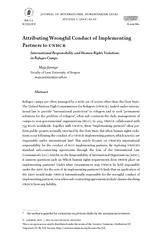Attributing Wrongful Conduct of Implementing Partners to UNHCR: International Responsibility and Human Rights Violations in Refugee Camps
Journal article, Peer reviewed
Published version
Permanent lenke
https://hdl.handle.net/1956/9526Utgivelsesdato
2014Metadata
Vis full innførselSamlinger
- Faculty of Law [2479]
Originalversjon
https://doi.org/10.1163/18781527-00501013Sammendrag
Refugee camps are often managed by a wide set of actors other than the Host State. The United Nations High Commissioner for Refugees (unhcr), tasked under international law to provide “international protection” to refugees and to seek “permanent solutions for the problem of refugees”, often sub-contracts the daily management of camps to non-governmental organizations (ngo). In 2013, unhcr collaborated with 733 ngos worldwide. Together with unhcr, these “implementing partners” often perform public powers normally exercised by the Host State. But when human rights violations occur following the conduct of a unhcr implementing partner, which actor(s) are responsible under international law? This article focuses on unhcr’s international responsibility for the conduct of ngo implementing partners. By exploring unhcr’s standard sub-contracting agreements through the lens of the International Law Commission’s (ilc) Articles on the Responsibility of International Organizations (ario), it answers questions such as: Which human rights requirements does unhcr place on implementing partners? Under what circumstances may unhcr be held responsible under the ario for the acts of its implementing partners? It finds that an application of the ario would make unhcr internationally responsible for the wrongful conduct of implementing partners, even when sub-contracting agreements include clauses absolving unhcr from any liability.

